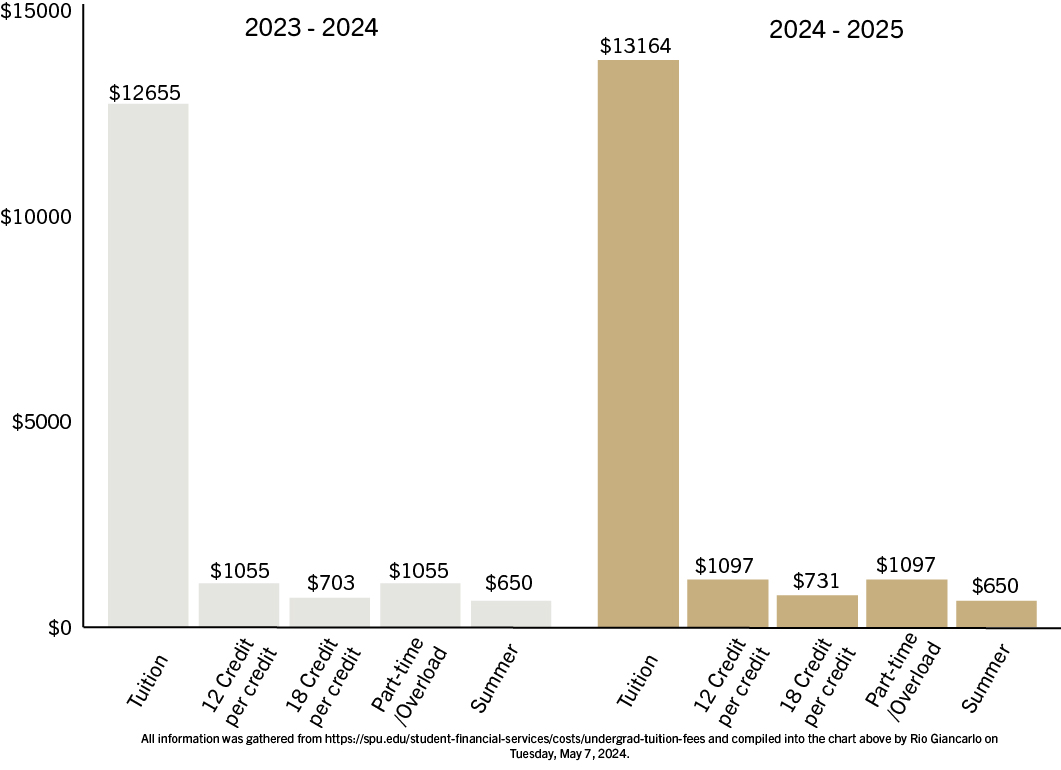
Returning to a dorm after a long day filled with lectures, choir practices or work shifts is an average day for a college student. For some, though, their everyday lives are filled with more than the average number of classes and higher-than-average tuition prices. These people are best known as credit overloaders.
Credit overload occurs when students take classes above Seattle Pacific University’s limit of 18 credits. As a result, students pay extra for their time and effort—one thousand dollars per extra credit, to be exact.
Charlotte Choat, a double major in linguistics and Honors, voiced her opinions regarding the extra costs of classes.
“I still don’t think it should cost extra because it’s my time and not the school’s time,” Choat said.
Some students appreciated the extra credits, which helped them get into classes right before graduating. Audrey Oscarson, an SPU Honors and journalism alumni, filled last-minute requirements through credit overloading before graduating in 2023.
“I used a credit overload during my last year at SPU. I ended up doing nineteen credits, so I only had to pay for one additional credit, which didn’t cost too much more than my regular tuition,” Oscarson said. “I was able to pay for it with scholarships and by picking up extra hours at my on-campus job.”
Specific majors and minors require more credits from students. Music majors and minors especially struggle with taking a large number of one to two-credit classes each quarter.
Samantha Dell, a music therapy major, discussed how the school works around this difficulty of having no choice but to take so many credits.
“We always get our nineteenth credit for free as music majors, and we can get the twentieth for free if it’s an ensemble class because they are often considered a service to the school,” Dell said.
Even with a busy schedule filled with classes, one can still find ways to stave off the anxiety of being alone in between it all. Dell enthusiastically explained the many benefits of being involved in a particular major filled with many familiar people.
“Find your people!” Dell said. “Find people who are doing similar things to you. It really helps to have people in the same major or minor and who are taking similar classes to help keep you on track.”
Choat recommends communicating with professors to decide whether to take advantage of credit overload.
“I think the professors here are really understanding, and if you express to them that you’re overloading or that you just have a lot on your plate, I think they’ll understand,” Choat said.
Remember to consider the pros and cons of classes taken when starting your journey with overloading. Oscarson speaks from their experience planning out their last couple of credit loads.
“If you’re looking to overload your credits, I would definitely recommend being aware of the classes you are choosing to take that quarter. It does pile up quickly, and if you have four high-intensity five-credit classes, you might be spending all of your time doing homework or in class,” Oscarson said.
While the financial burden and time management challenges might seem overwhelming, remember that support from professors, peers and campus is available to help navigate the facets of an overloaded schedule.
Stay organized, communicate openly and find a community to rely on during tough times. With determination and support, successful navigation of credit overloading’s many challenges is possible
















































































